Prostate health is a topic that is often overlooked, but it is important to take care of this gland to maintain overall health and well-being. One way to support prostate health is to take supplements that contain vitamin E and B6. These vitamins are essential for maintaining healthy prostate function and may help to alleviate symptoms associated with an enlarged prostate.
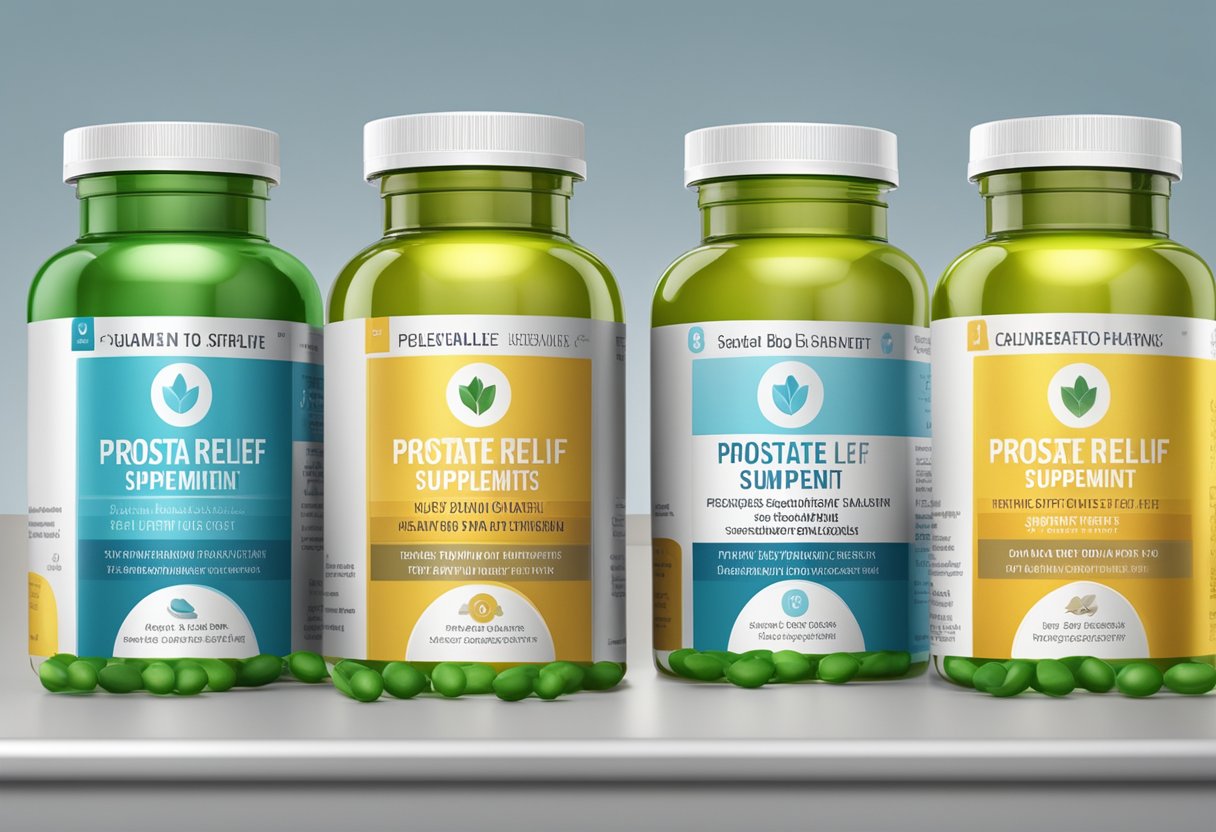
Understanding Prostate Health is crucial to maintaining good health. The prostate gland is a small, walnut-shaped gland that is located below the bladder in men. It produces a fluid that is a component of semen. As men age, the prostate gland can become enlarged, leading to a condition called benign prostatic hyperplasia (BPH). BPH can cause urinary symptoms such as frequent urination, difficulty starting urination, and weak urine flow. In some cases, BPH can lead to more serious complications such as bladder damage or urinary tract infections.
Key Takeaways
- Vitamin E and B6 are essential for maintaining healthy prostate function.
- Prostate supplements containing these vitamins may help to alleviate symptoms associated with an enlarged prostate.
- It is important to understand prostate health to maintain overall health and well-being.
Understanding Prostate Health
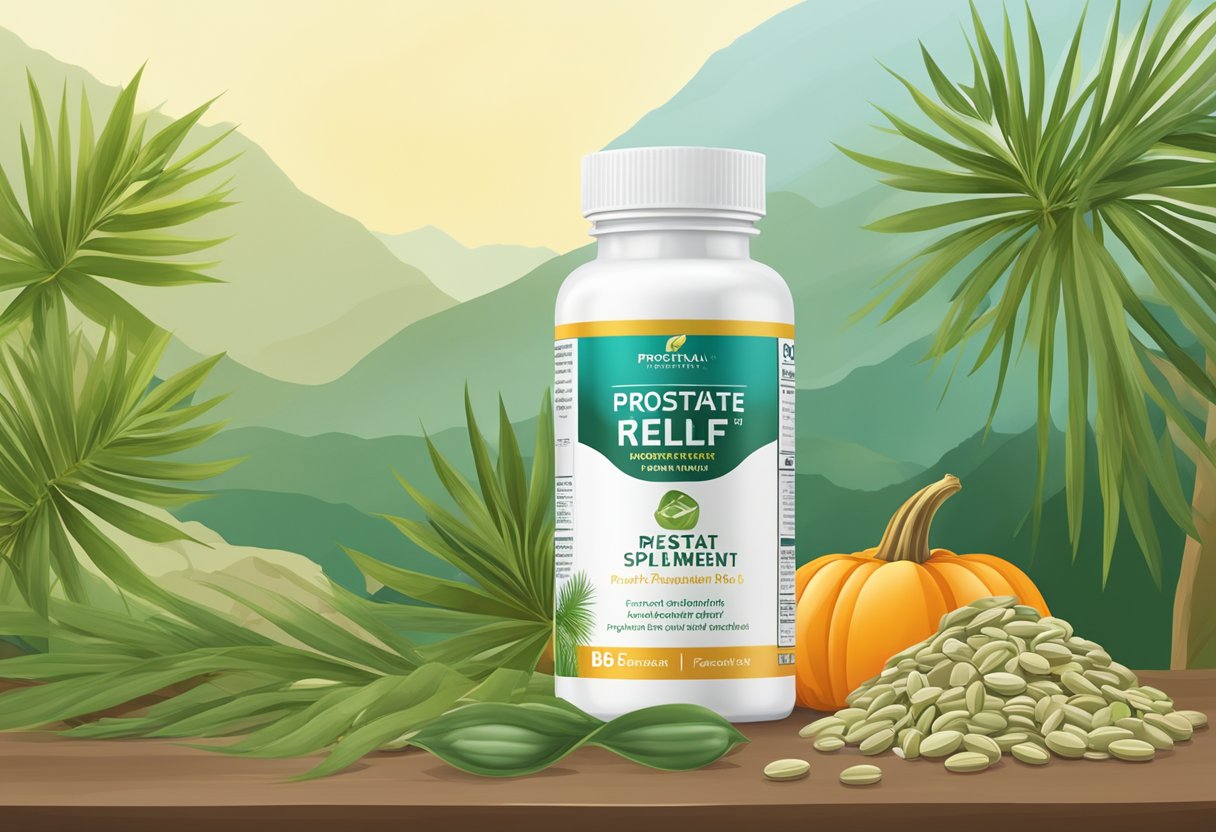
The prostate gland is a small, walnut-shaped gland that is part of the male reproductive system. It is located just below the bladder and surrounds the urethra, the tube that carries urine and semen out of the body. The prostate gland produces and stores seminal fluid, which nourishes and protects sperm.
The Role of the Prostate Gland
The prostate gland plays an important role in male sexual health. It produces and secretes a fluid that makes up a significant portion of semen. This fluid helps to nourish and protect sperm, and it also helps to transport sperm through the urethra during ejaculation.
Common Prostate Conditions
There are several common prostate conditions that can affect men as they age. These include benign prostatic hyperplasia (BPH), prostatitis, and prostate cancer.
BPH is a non-cancerous enlargement of the prostate gland. It is a common condition that affects many men as they age. Symptoms of BPH can include frequent urination, difficulty starting and stopping urination, weak urine flow, and the need to urinate urgently.
Prostatitis is an inflammation of the prostate gland. It can be caused by bacterial or non-bacterial factors and can lead to pain or discomfort in the pelvic region, difficulty urinating, and other symptoms.
Prostate cancer is a malignant tumor that develops in the prostate gland. It is the most common cancer in men and is often slow-growing. Symptoms of prostate cancer can include difficulty urinating, blood in the urine or semen, and pain in the lower back, hips, or thighs.
Risk Factors for Prostate Issues
Several factors can increase a man’s risk of developing prostate issues. Age is a significant risk factor, as prostate issues are more common in older men. Family history of prostate cancer can also increase a man’s risk of developing the condition. Other risk factors include obesity, a diet high in fat and red meat, and exposure to certain chemicals.
Nutrition and Prostate Health
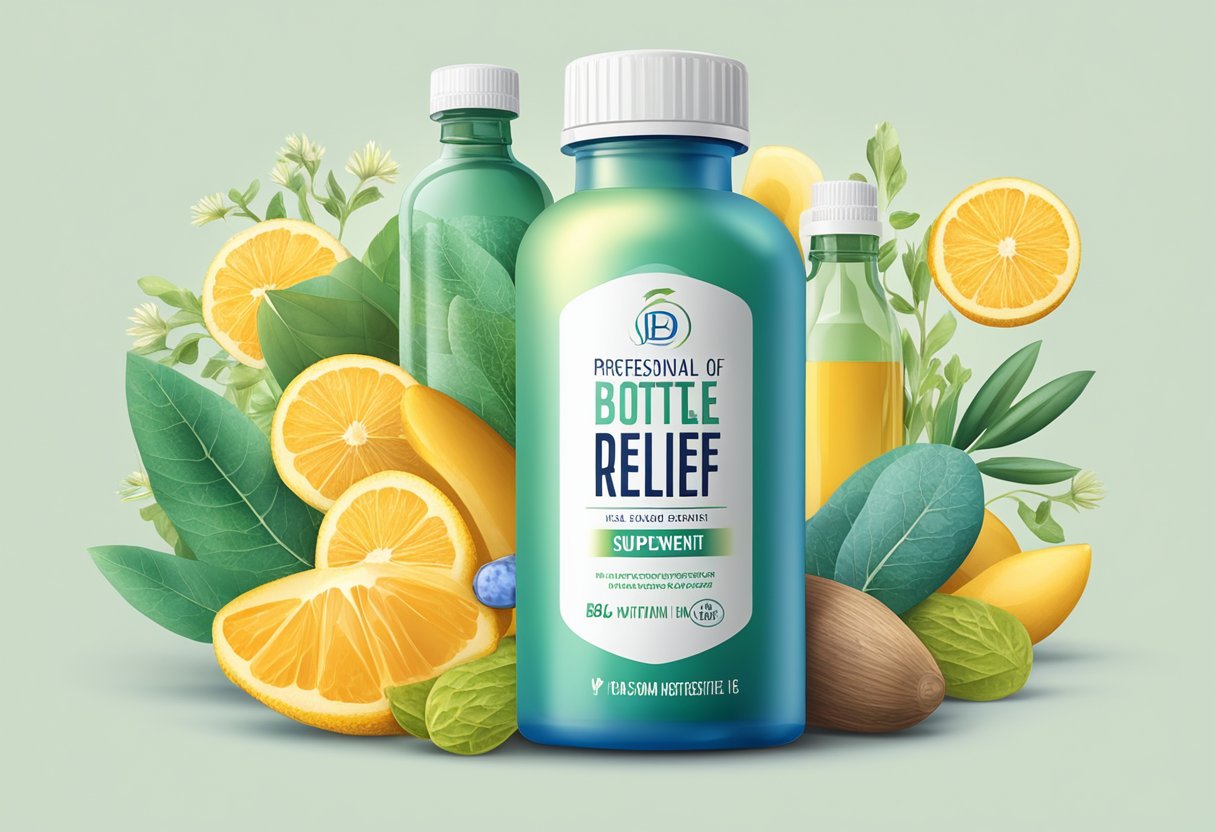
Maintaining a healthy prostate is important for men of all ages. In addition to regular check-ups with a doctor, nutrition plays a key role in supporting prostate health. A balanced diet rich in essential vitamins and minerals can help reduce the risk of prostate problems.
Essential Vitamins for the Prostate
Vitamins are essential for overall health and well-being, and some have been shown to be particularly beneficial for prostate health. Vitamin E, for example, is a powerful antioxidant that can help protect cells from damage caused by free radicals. Vitamin B6 is also important for prostate health, as it helps regulate hormone levels and supports immune function.
Foods rich in vitamin E include nuts, seeds, leafy greens, and vegetable oils. Vitamin B6 can be found in foods such as chicken, fish, potatoes, and bananas.
Minerals and Prostate Function
Minerals such as zinc, selenium, and calcium are also important for prostate health. Zinc, in particular, is essential for the proper functioning of the prostate gland. Studies have shown that a diet high in zinc can help reduce the risk of prostate problems.
Selenium is another mineral that has been shown to be beneficial for prostate health. It is a powerful antioxidant that can help protect cells from damage. Calcium is also important for prostate health, as it helps support bone health and may help reduce the risk of prostate cancer.
Dietary Considerations
In addition to vitamins and minerals, a healthy diet rich in fruits, vegetables, whole grains, and lean protein can help reduce the risk of prostate problems. Foods that are high in antioxidants, such as berries and leafy greens, can also be beneficial for prostate health.
It is important to limit the intake of processed foods, saturated fats, and sugary drinks, as these have been linked to an increased risk of prostate problems. It is also important to stay hydrated by drinking plenty of water and to limit alcohol consumption.
Overall, a balanced diet rich in essential vitamins and minerals, along with regular exercise and a healthy lifestyle, can help support prostate health and reduce the risk of prostate problems.
Prostate Supplements
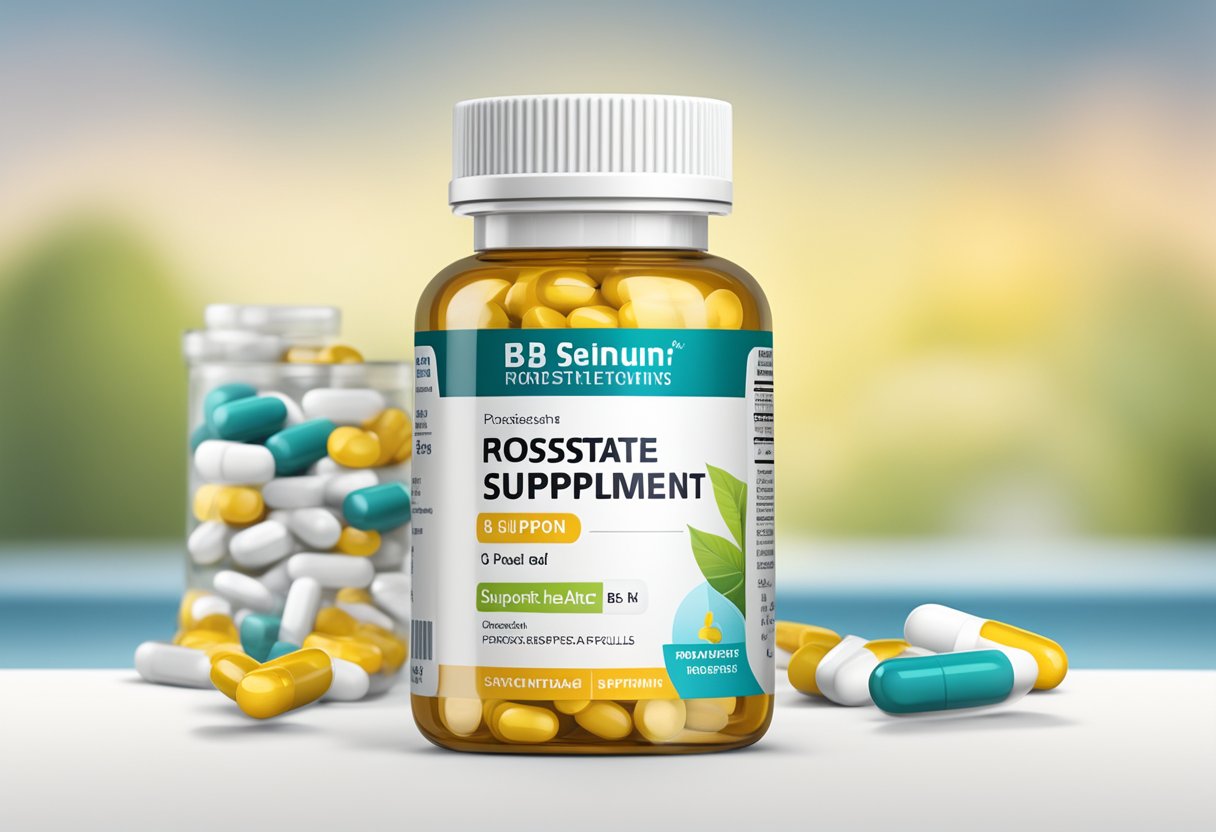
Prostate supplements are becoming more popular as men look for ways to support their prostate health. These supplements often contain vitamins and minerals, as well as other ingredients that are thought to be beneficial for prostate health. In this section, we will explore some of the most popular supplements for prostate health, evaluate their efficacy, and discuss potential side effects.
Popular Supplements for Prostate Health
There are many supplements on the market that claim to support prostate health. Some of the most popular ingredients in these supplements include:
- Saw Palmetto: This plant sterol is commonly used to support prostate health and reduce inflammation.
- Lycopene: This antioxidant is found in tomatoes and is thought to have anti-inflammatory properties.
- Green Tea: Green tea contains catechins, which have been shown to have anti-inflammatory effects.
- Pumpkin Seed: Pumpkin seeds are rich in zinc, which is important for prostate health.
Evaluating Supplement Efficacy
While many supplements claim to support prostate health, it is important to evaluate their efficacy. Clinical trials are the gold standard for evaluating the efficacy of supplements. In some cases, clinical trials have shown that certain supplements can be effective in supporting prostate health. For example, a clinical trial found that saw palmetto was more effective than placebo in reducing symptoms of benign prostatic hyperplasia (BPH).
However, not all clinical trials have shown positive results. For example, a clinical trial found that green tea did not have a significant effect on prostate-specific antigen (PSA) levels, which are a marker of prostate health.
Potential Side Effects
While many supplements are generally safe, it is important to be aware of potential side effects. Some supplements can cause side effects such as gastrointestinal upset, allergic reactions, and sexual dysfunction. For example, a clinical trial found that saw palmetto was associated with an increased risk of sexual dysfunction compared to placebo.
It is also important to note that supplements can interact with medications. For example, saw palmetto can interact with certain medications used to treat BPH.
In conclusion, prostate supplements can be a useful tool for supporting prostate health. However, it is important to evaluate their efficacy and be aware of potential side effects. Men should talk to their healthcare provider before starting any new supplement regimen.
Lifestyle and Prostate Health
Maintaining a healthy lifestyle is crucial for prostate health. Exercise and stress management are two important factors that can help control and prevent prostate-related issues. Additionally, staying hydrated is essential for optimal urine flow and overall prostate function.
Exercise and Stress Management
Regular exercise and stress management techniques can help reduce the risk of prostate-related issues and improve quality of life. Exercise can help control weight, reduce inflammation, and improve overall cardiovascular health. Stress management techniques such as meditation, deep breathing, or yoga can help reduce stress and promote relaxation.
Hydration and Prostate Function
Staying hydrated is essential for optimal prostate function. Drinking plenty of water can help flush out toxins and reduce the risk of urinary tract infections. Adequate hydration can also help improve urine flow and reduce inflammation in the prostate gland.
In addition to exercise, stress management, and hydration, maintaining a healthy diet is also important for prostate health. Foods packed with vitamin E and B6, such as nuts and leafy greens, can help support prostate health. However, it is important to consult with a healthcare professional before making any significant changes to your diet or lifestyle.
Overall, a healthy lifestyle can help control and prevent prostate-related issues and improve quality of life.
Clinical Perspectives

Treatment Options for Prostate Conditions
When it comes to treating prostate conditions, there are a variety of options available. The most common condition affecting the prostate is benign prostatic hyperplasia (BPH), which is a non-cancerous enlargement of the prostate gland that can cause urinary problems. Treatment options for BPH include lifestyle changes, medications, and surgery.
Lifestyle changes that can help relieve symptoms of BPH include avoiding caffeine and alcohol, drinking plenty of water, and avoiding fluids before bedtime. Medications such as alpha-blockers and 5-alpha-reductase inhibitors can also be used to treat BPH. In more severe cases, surgery may be necessary to remove part of the prostate gland.
The Role of Medical Professionals
Medical professionals play a crucial role in the diagnosis and treatment of prostate conditions. A physician can perform a physical exam and order diagnostic tests such as a prostate-specific antigen (PSA) blood test or a transrectal ultrasound to help diagnose prostate conditions.
Once a diagnosis has been made, a physician can recommend a treatment plan tailored to the patient’s specific needs. This may include lifestyle changes, medications, or surgery. It is important for patients to work closely with their medical professionals to manage their prostate conditions and ensure the best possible outcomes.
Vitamin E and B6 are two nutrients that have been shown to support prostate health. While these nutrients can be obtained through diet, some individuals may benefit from supplements. However, it is important to consult with a medical professional before starting any new supplement regimen to ensure safety and efficacy.
Herbal and Alternative Remedies
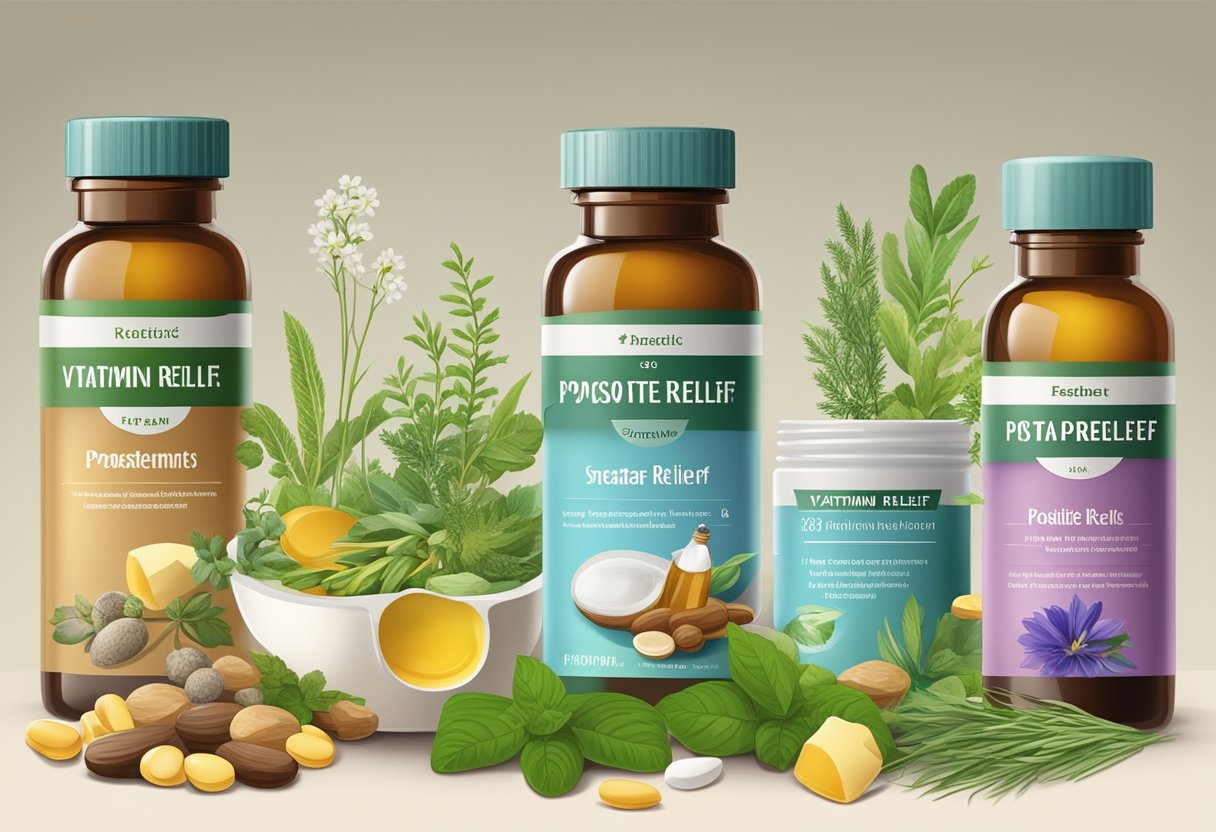
There are several herbal and alternative remedies that may help support prostate health. These remedies are often used as complementary therapies in addition to traditional medical treatments.
Herbs and Plant Extracts
Herbs and plant extracts have long been used for their medicinal properties. Some herbs that are commonly used to support prostate health include nettle root extract, pygeum, and saw palmetto berries.
Nettle root extract has anti-inflammatory properties and may help reduce symptoms of an enlarged prostate. Pygeum is another herb that has been used to help support prostate health. It contains plant sterols that may help reduce inflammation and improve urinary function. Saw palmetto berries are another popular herbal remedy for prostate health. They contain plant sterols and may help reduce inflammation and improve urinary function.
Complementary and Alternative Medicine (CAM)
Complementary and alternative medicine (CAM) is a term used to describe a variety of therapies that are used in addition to traditional medical treatments. Some CAM therapies that may be helpful for prostate health include green tea extract, pumpkin seed oil, and pomegranate extract.
Green tea extract is rich in antioxidants and may help reduce inflammation in the body. Pumpkin seed oil is also rich in antioxidants and has been shown to improve urinary function in men with an enlarged prostate. Pomegranate extract is another antioxidant-rich supplement that may help support prostate health.
It is important to note that while these remedies may be helpful for some individuals, they should not be used as a substitute for traditional medical treatments. It is important to speak with a healthcare provider before starting any new supplement or therapy.
Frequently Asked Questions
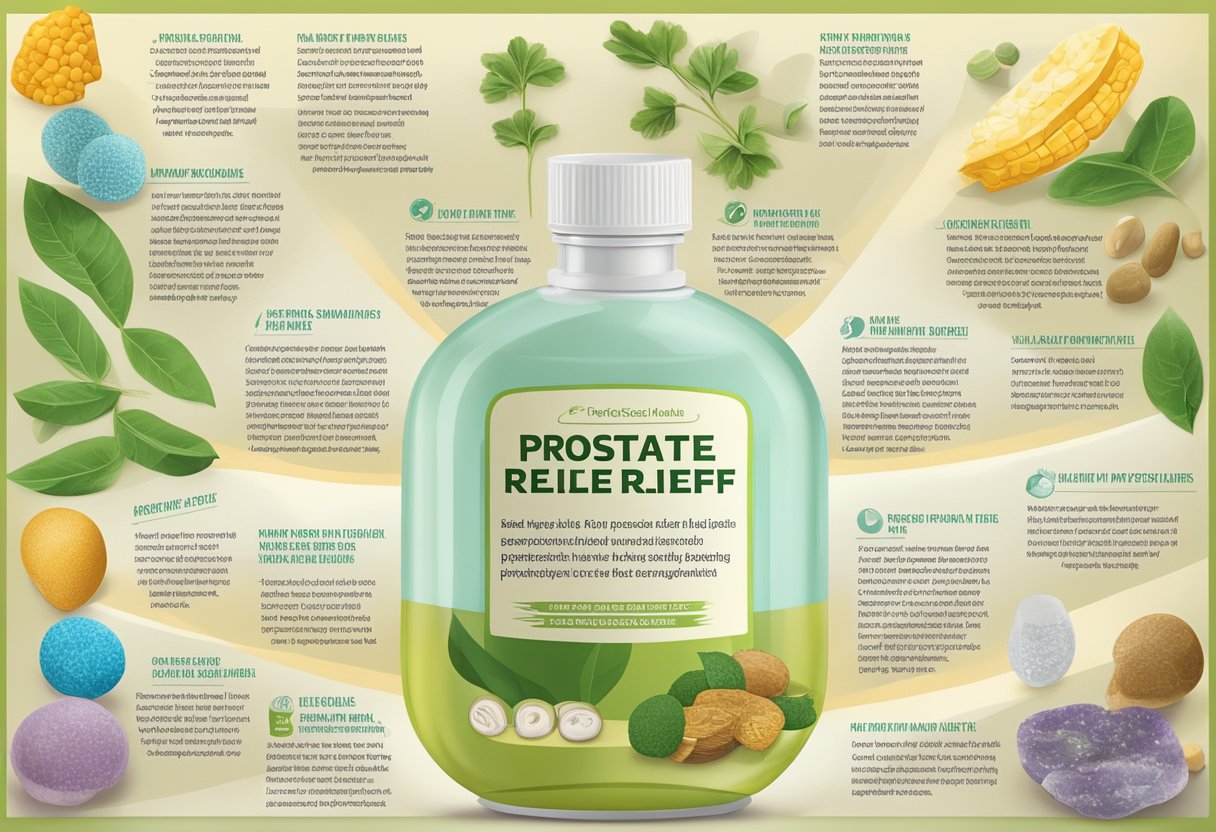
What are the advantages of combining saw palmetto with zinc for prostate health?
Saw palmetto and zinc have both been shown to be effective in supporting the prostate. Saw palmetto is believed to work by inhibiting the conversion of testosterone to dihydrotestosterone (DHT), which is associated with prostate enlargement. Zinc is important for prostate health because it helps to regulate the production of testosterone. Combining saw palmetto with zinc may be advantageous because it may provide a more comprehensive approach to supporting prostate health.
How effective is Spring Valley Prostate and Bladder Control in managing prostate-related issues?
Spring Valley Prostate and Bladder Control is a supplement that contains a blend of ingredients that are believed to support prostate and bladder health. These ingredients include saw palmetto, pumpkin seed extract, and cranberry extract, among others. While some users have reported positive results with this supplement, it is important to note that the effectiveness of any supplement may vary depending on the individual.
Which supplement is most effective for reducing prostate enlargement?
There is no one-size-fits-all answer to this question, as the effectiveness of a supplement may depend on a variety of factors, including the individual’s age, overall health, and the severity of their prostate enlargement. Some supplements that are commonly used for prostate health include saw palmetto, beta-sitosterol, and pygeum africanum extract. It is important to consult with a healthcare provider before taking any supplement for prostate health.
Can vitamin E contribute to improved prostate health and how?
Vitamin E is an antioxidant that is believed to have a number of health benefits, including supporting the prostate. Some studies have suggested that vitamin E may help to reduce the risk of prostate cancer, although the evidence is not conclusive. Vitamin E may also help to reduce inflammation in the prostate gland, which may be beneficial for individuals with prostate-related issues.
What potential adverse effects should be considered when taking prostate health supplements?
Some supplements that are commonly used for the prostate, such as saw palmetto and beta-sitosterol, may cause side effects in some individuals. These side effects may include gastrointestinal upset, headache, and dizziness. It is important to consult with a healthcare provider before taking any supplement for prostate health, especially if you are taking any medications or have any underlying health conditions.
Are vitamins specifically formulated for prostate health scientifically proven to be beneficial?
While some studies have suggested that certain vitamins and supplements may be beneficial for prostate health, the evidence is not conclusive. It is important to consult with a healthcare provider before taking any supplement for prostate health, and to follow the recommended dosage and usage instructions.































